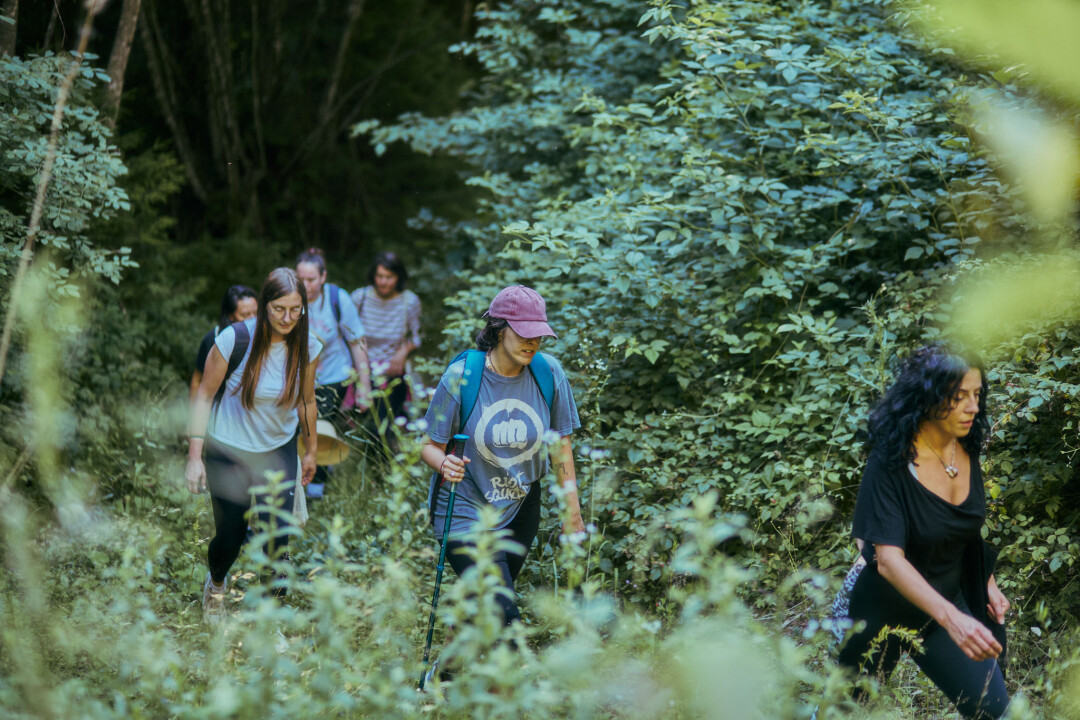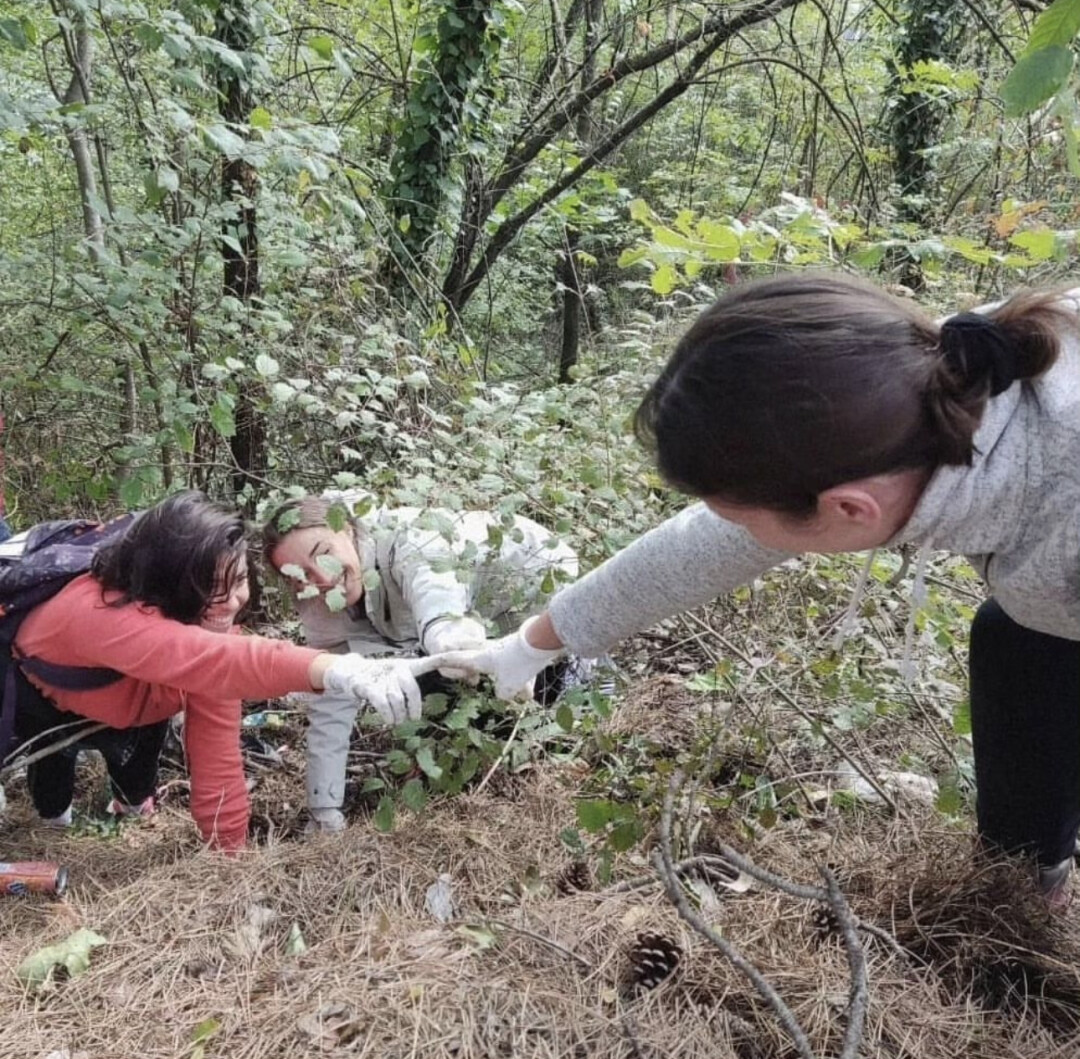“We never would have guessed that one clean-up activity would start the first female eco-movement in Montenegro,” says Ivana Čogurić, one of the founders of Ecopatriotizam, a movement that is fighting against pollution of natural spaces in Montenegro.
Former editor and radio host at a national FM station, it was during the Covid-19 lockdown that Ivana and her friends realised the extent of the pollution of green spaces around the Nikšić municipality while walking through the forest.
“The town which used to be known as the town of beer, steel, and rock'n'roll now had become the town of trash,” she says.
Ivana and her friends decided to start collecting trash during their walks. Through social media outreach and an article in the local media about their efforts, the movement gained strong community involvement, with many volunteers joining their clean-up actions.
“After our first clean-up, we felt incredible. We picked up a lot of trash. We decided to make an Instagram page hoping that others might join us,” she says.
Although post-lockdown routines made field cleaning actions less frequent, support for the Ecopatriotizam movement persisted. Today, Ecopatriotizam volunteers have also become whistleblowers reporting illegal dumping and they are united by the shared goal of environmental preservation.
Ivana explains that Ecopatriotizam’s work transcends the ethnic divisions between Serbs and Montengrins that are exacerbated by the public discourse and policies. Ecopatriotizam calls for unity behind a common cause: the protection of Montenegro’s natural resources.
“The politicians were waving flags of Serbia or flags of Montenegro, and we just waved trash bags. Ecopatriotizam became something that people could connect to because everyone loves nature, but the politicians and their ideologies made us forget that. They push us to the side and told us no, you are either Serb or Montenegrin.”
She relates that in the absence of proper public policies and actions to tackle the pollution problem, Ecopatriotizam had to take on the role of the government as the main environmental-protection actor in the country.
“Citizens call us with their problems constantly, but we can’t solve them all. Money helps of course, but we also need people, partners. We need politicians to know that we share these problems that they are allowing to happen. Eventually they will become their problems too. Politicians are citizens too,” she says.

As part of its efforts to encourage a more environmental approach in society, the Ecopatriotizam team launched a social experiment in the cities of Nikšić, Podgorica and Žabljak called ‘All for life and life for all’.
They invited inhabitants from the three cities to bring in their recyclable materials to designated areas over a 10-day period. The collected materials were then taken to a recycling centre, with all proceeds from the recycling effort donated to a citizen of Nikšić who needed a kidney transplant.
The public response to the campaign was overwhelming, with people enthusiastically participating, leading to multiple daily trips to the recycling centre to dispose of the collected items. Even after the official campaign ended, community members continued to bring in recyclables, driven by their desire to help save a life.
“We were so happy because through that social experiment we basically proved that people do want to recycle. People have the urge to recycle, and people have the urge to save lives, and we can use recycling movements to save lives,” says Ivana.
Before receiving support from EED, the Ecopatriotizam team operated entirely as volunteers, working on the project alongside their full-time jobs. The grant enabled two of the five core members to leave their jobs and commit themselves fully to their activism and the development of new projects within the organization.
Today, the team are actively empowering women and environmental activists through various initiatives.
A "Bold and Empowered" workshop series helped participants recognise their potential and advocate for freedom of speech in Montenegrin society. These sessions equipped women with tools for self-development, inspiring many to engage in social causes and join protests against violence toward women and environmental degradation.
Ecopatriotizam also launched their first eco-activism camp, "Time Out or Burnout," educating participants on a new waste management law and offering workshops to prevent and manage burnout, a condition not yet recognized in Montenegro. The camp provided a safe space for activists to share their burnout experiences and discuss the lack of understanding they often face. A psychologist offered tools for managing burnout and continues to provide mental health support to environmental activists who are particularly at risk.
After the camp, Ecopatriotizam released a video campaign on activist burnout. They gathered feedback from a focus group of women, whose input and experiences helped highlight burnout as a widespread issue affecting society. The campaign pointed out the inadequacies in Montenegro's healthcare system in addressing burnout, stressing the need for better support.
"The government doesn't want us to be educated. They don't want us to be strong in our heads because when you are strong in your head, you are strong in your voice. When you're strong in your voice, you're strong in your actions. When you're strong in your actions, you build a stronger community," says Ivana.
This article reflects the views of the grantees featured and does not necessarily represent the official opinion of the EED.
